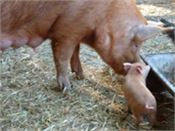Rice Bran In Weanling Pig Diets Does Not Reduce Growth Performance

• Full fat or defatted rice bran can be included in weanling pig diets at up to 20 percent without negatively affecting growth performance.
• Inclusion of 10 percent full fat or defatted rice bran maximized average daily gain.
• Inclusion of 20 percent full fat rice bran maximized the gain to feed ratio.
URBANA, ILL.
Research at the University of Illinois has demonstrated that adding rice bran to weanling pig diets does not have a detrimental effect on growth performance. Rice bran is a co-product of the rice milling process which is often added to swine diets; it is relatively inexpensive, and it may improve gut health in weanling pigs.
A team led by Hans Stein, professor of animal sciences at the U of I, fed diets containing 10, 20, or 30 percent of either full fat rice bran (FFRB) or defatted rice bran (DFRB) to weanling pigs. The growth performance of these pigs was compared to that of pigs fed a control diet based on corn, soybean meal, and whey powder. All diets were formulated to contain the same amount of digestible indispensable amino acids.
“Full fat and defatted rice bran both contain more dietary fiber than corn,” says Stein. “Because high fiber concentrations can reduce digestibility of energy and nutrients, we wanted to investigate whether or not including rice bran in the diets would affect growth performance.”
For both FFRB and DFRB, increasing inclusion rates decreased the average daily feed intake, probably due to the increased bulk of the diet. Metabolizable energy intake also decreased with increasing inclusion rate of FFRB or DFRB, but pigs fed diets containing DFRB had greater average daily feed intake than pigs fed diets with FFRB.
“With the decreased feed and energy intake, pigs might be expected to gain less when fed diets containing FFRB or DFRB,” Stein says. “But that was not what we observed.”
There was no difference in final body weight between pigs fed the control corn-soybean meal diet and pigs fed any of the diets containing FFRB or DFRB.
Average daily gain (ADG) for pigs fed diets containing 10 percent FFRB or DFRB was greater than for pigs fed the control diet. Feeding diets containing 20 percent FFRB or DFRB had no effect on ADG compared with the control diet.
The gain to feed ratio (G:F) was greatest in pigs fed diets containing 20 percent FFRB. Inclusion of up to 30 percent DFRB had no negative effect on G:F compared with pigs fed the control diet.
“These results indicate that rice bran can be fed to weanling pigs at inclusion rates of up to 20 percent without compromising growth performance,” says Stein.
Funding for this research was provided by AB Vista (Marlborough, UK). Full fat rice bran was donated by Rice Bran Technologies (Scottsdale, AZ).
The paper, “Effects of full fat or defatted rice bran on growth performance and blood characteristics of weanling pigs,” was co-authored by Gloria Casas. It was published in a recent issue of the Journal of Animal Science, and can be found online at https://www.animalsciencepublications.org/publications/jas/articles/94/10/4179. ∆